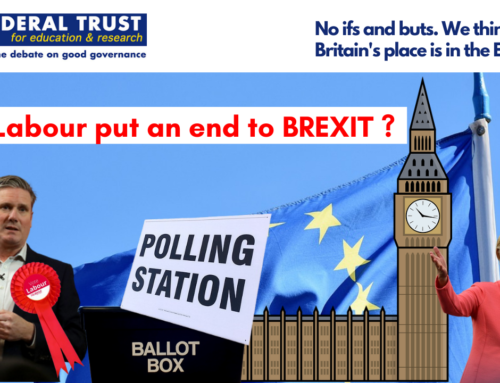The City is home to a multitude of businesses that support the financial markets. However, banking has always been at the City’s heart and, in recent decades, the clearing of derivatives has become central to both banking and securities markets.
Pre-Brexit, these markets were also central to the European Union – and especially to the euro area – as so much of “Europe’s” financial system was physically located in London. Post-Brexit, the EU is – understandably – wondering whether the City’s continued domination is a “good thing”.
The EU has been pushing EU banks to do their derivative business within the EU but there are powerful cost and efficiency reasons for concentration.
Should it sub-contract parts of its financial infrastructure that are vital to its own financial stability to a “third country”? Is that third country a reliable partner who can be trusted – in a moment of crisis – to act in the best interests of the EU, especially if there may be large costs involved? As things stand today, most people would probably answer a resounding No to both questions. So what should the EU do about it?
Banking
Recently, Edouard Fernandez-Bollo, a member of the Board of the EU’s Single Supervisory Mechanism, laid out some of the EU’s thinking – with an emphasis on both the EU and UK applying the Basel III standards as the best way of maintaining regulatory compatibility. After all, the UK had been a driving force behind the development of these standards since their inception nearly 40 years ago.
However, the EU has made it crystal clear since Brexit came onto the horizon that “empty shell institutions are not acceptable in the euro area.” Much as it would suit the convenience of London-based bankers to provide services by flying in to do the deal and then supplying the finance from their UK base, the EU would insist on a fully regulated EU bank – with adequate capital, liquidity and management structure – so it could ensure proper control.
Of course, the Covid pandemic has made it more difficult to make the staffing changes to enforce this regime and the EU’s banking regulator – the SSM – has taken a pragmatic approach for the moment. However, it seems that is now changing and there is increasing pressure to deliver proper staffing levels in EU branches of British and other non-EU banks operating in the EU.
Much as it would suit the convenience of London-based bankers to provide services by flying in to do the deal and then supplying the finance from their UK base, the EU would insist on a fully regulated EU bank – with adequate capital, liquidity and management structure – so it could ensure proper control.
But that raises another question: branches are subject to national – rather than EU – regulation and are allowed to have lower levels of capital and liquidity than its parent as the parent is expected to provide the extra resources if needed. But if the parent is in a non-EU ‘third country’ how can the EU enforce the provision of emergency assistance? The risk is worsening rapidly: such branches now have €510 bn of assets – up €120 bn in a year.
The 27th October `banking package’ proposals from the Commission completed the plans for finalising the introduction of Basel III standards but also tightened the rules on third-country branches. According to the European Banking Authority, the largest 15 third-country banking groups hold more than three quarters of their EU assets via such branches. Commissioner McGuiness was insistent that the new rules are “similar to the rules that non-EU countries have for branches that operate in their territories”.
Central Counterparties (CCPs)
The totemic issue in post-Brexit finance is the location of CCPs[1]. In the past three or four decades, they have blossomed. Their place at the heart of financial infrastructure was cemented after the 2007/8 Great Financial Crash as they were seen as the answer to the excessive inter-connectedness of the financial system’s holdings of derivatives. But the logical – though unforeseen – risk was that the financial stability risks of the global system would be concentrated into a handful of CCPs – turning them into the “nuclear power stations” of finance – wonderful if they work well, but unthinkable if they go wrong.
About 90% of the euro interest rate swaps business is still done in London – mainly through LCH and ICE Clear Europe. The EU has been pushing EU banks to do their derivative business within the EU but there are powerful cost and efficiency reasons for concentration – meaning staying in London where it is easy to provide “margin” in a number of currencies.
The temporary solution has been for the European Commission to exercise its own power to grant “equivalence” to these two CCPs (LCH and ICE) so that business carries on as usual – until June 2022. At the same time, the European Securities and Markets Authority (ESMA) has established direct supervision this year of these two bodies – in close co-operation with the Bank of England.
In March 2019, the EU reached agreement on “EMIR 2.2”[2] and began the process of consultations on how its detailed provisions could be brought into force. ESMA is
required to undertake a comprehensive assessment of the risks to financial stability of the Union, its Member States, currencies, clearing members and clients, to determine whether the existing EMIR regulatory and supervisory toolkit suffices to address these risks and to consider the costs, benefits and consequences of a potential decision not to recognise a CCP or certain of its services.
The methodology was published in July and the results are due in mid-2022. Commissioner McGuiness has already said there will be no ‘cliff edge’ whatever the decision. The ultimate decision will be both economic and political: CEPS[3] recently published a report arguing that developing “…central clearing in the EU should be part of a clear long-term strategy … and be given the appropriate time to mature.”
The sound from the tumbril’s slow-turning wheels may be some way off but it still seems to be drawing closer for the City of London.
ENDNOTES
[1] CCPs effectively guarantee contractual obligations agreed between two counterparties, both of which would be participants in the CCP. If one counterparty fails, the other is protected via the default management procedures and resources of the CCP.
[2] The revised European Market Infrastructure Regulation (EMIR) was tweaked to strengthen CCP supervision –extending it to non-EU CCPs
[3] https://www.ceps.eu/ceps-publications/setting-eu-ccp-policy-much-more-than-meets-the-eye/






Leave A Comment